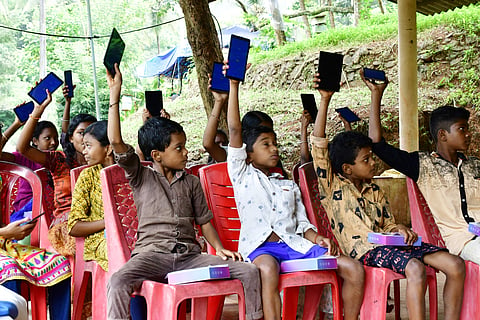

One of the worst things that can happen to a child is the disruption of their education. And the pandemic has caused many such disruptions across the world. But things were way more acute in the Malappuram's Chaliyar village where dozens of students had to forego studies for a year and a half because they had neither classes nor internet. But thanks to the efforts of Jan Shikshan Sansthan (JSS) in implementing long distance Wi-Fi (Yes, that really is a thing!), their education is now back on track. We talked to the Director of JSS, V Ummer Koya, about how the project came to be a success and what they have lined up for the coming days. Excerpts:
How did you identify this hamlet to execute the learning project?
This project was taken up in the Chaliyar gram panchayat as part of the Sansad Adarsh Gram Yojana by local MP PV Abdul Wahab. It is the village which has highest tribal population in all of Malappuram district. Within this panchayat, we chose three specific tribal settlements, namely Palakkayam, Ambumala and Vettilakolli. All these colonies are located within forest areas quite far away from Nilambur town. Only one of them has an electricity connection and even that is intermittent.
How exactly did these tribal children get an education?
When we talked to our technology partners, we found that there something called long-distance Wi-Fi that can be implemented here. For that, we first established a small tower at Nilambur which would serve as the main server hub. Then we erected a tower each in the tribal colonies and an additional tower on a hilltop. At first, we had our doubts about whether a speed of 100 mbps would be received at the tribal settlements as promised. But it all worked perfectly. Then we established sheds at each of the settlements where we installed smart TVs so that the classes on the KITE-Victers channel could be viewed by the students. We also appointed a community mobiliser at each centre to oversee things. That is how these students resumed their classes after a gap of one and a half years. We have also added special tuitions for some of the kids because, obviously, the long gap has taken a toll on their learning abilities.
How have the communities welcomed this new addition to their settlements?
They have really internalised this development. They personally overlook the activities at the study centre by appointing a chief from their own colony. We have also introduced online awareness sessions for them on health issues. They looked into the COVID-19 protocol to be followed, importance of getting vaccinated and general hygiene practices.
What have been some of the challenges that you have faced along the way?
The construction phase of the towers was a big obstacle since the terrain is very harsh. People had to walk three hours just to get to the site. What really got us over the line was the service provided by the tribal people themselves. They have completely taken up the ownership of this project. They even help with the maintenance of the towers by setting up shifts to overlook them so that forest elephants do not cause any damage.
Another issue that we face here is that of people bribing tribal people with alcohol. To curb that, we are trying to set up CCTV cameras.
What happens next now that these study centres being in operation for the tribal people?
There are two projects that we are currently working on. The first is implementing a telemedicine facility at the study centre. What this would imply is that patients can simply visit the centre and place their hands inside the telemedicine machine there and a doctor seated at Nilambur General Hospital can diagnose them remotely. There would also be medicines that would be stocked which can be prescribed by the doctor.
The second project is to develop an online portal where the tribal people can register and bring forth the forest produce that they have obtained and sell them online following an auction. This would enable them to get maximum value for their product without getting ripped off by middlemen.
